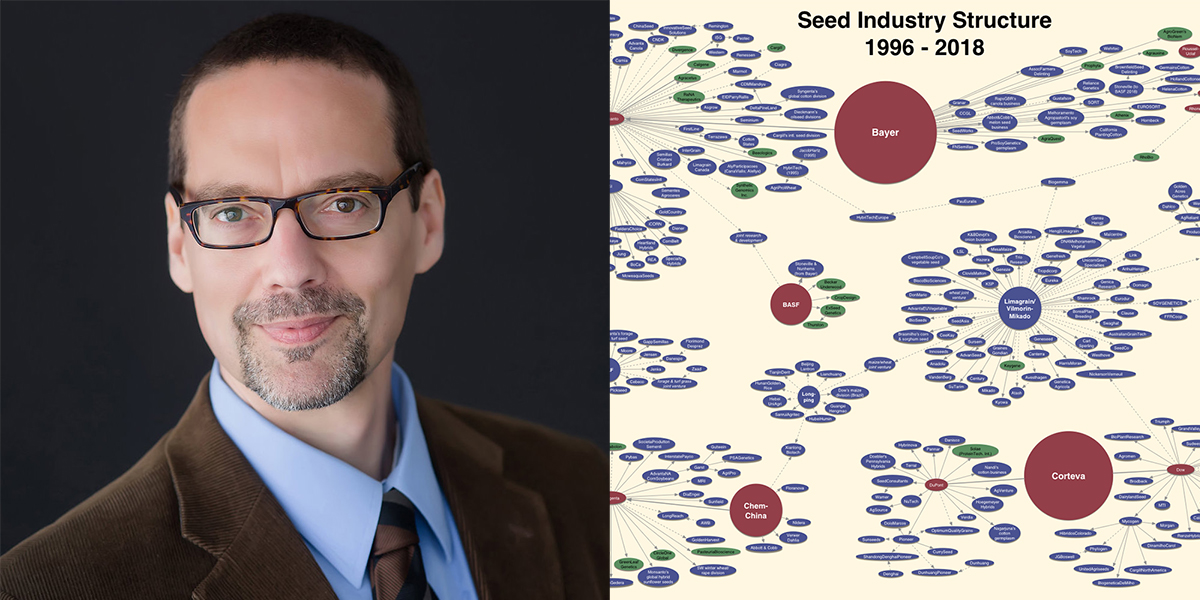
- This event has passed.
Phil Howard – Consolidation in the Global Seed Industry: Drivers and Impacts | GES Colloquium

GES Colloquium Home | GES Colloquium MediaSite Live-Stream | YouTube Library (Past Colloquia)
Consolidation in the Global Seed Industry: Drivers and Impacts
Speaker: Phil Howard, Ph.D, Professor of Community Sustainability at Michigan State University
Abstract
Much of the food we eat is derived from plants grown from seeds, or from animals that consume these types of plants. The seed industry has changed dramatically in recent decades, however, moving from one characterized by thousands of small and mostly family-owned businesses, to one in which more than 60% of proprietary seed sales globally are controlled by just four corporations. Importantly, these same four firms are even more dominant in global sales of pesticides. The impacts of these changes have included higher prices for farmers, fewer seed varieties, reduced rates of innovation, and a decline in seed saving. These trends are driven by changes in government policies that include reduced antitrust enforcement and increasing intellectual property protections on seeds, as well as a system that incentivizes large firms to continually increase their power. Dominant firms are facing increasing public opposition, however, and alternatives such as open source and heirloom seed firms, while currently very small, are growing rapidly. This resistance illuminates key leverage points for addressing the negative impacts of consolidation, and potentially to reverse these trends.
Related Publications
Howard, Philip H. 2016. Concentration and Power in the Food System: Who Controls What We Eat? London: Bloomsbury Academic.
Howard, Philip H. 2015. Intellectual Property and Consolidation in the Seed Industry. Crop Science, 55(6), 2489-2495.
Howard, Philip H. 2009. Visualizing Consolidation in the Global Seed Industry: 1996–2008. Sustainability, 1(4), 1266-1287.
Speaker Bio
Phil Howard is an Associate Professor of Community Sustainability at Michigan State University, and a member of the International Panel of Experts on Sustainable Food Systems. He is the author of Concentration and Power in the Food System: Who Controls What We Eat? His visualizations of food system changes have been featured in numerous outlets including the New York Times, Washington Post, Wall Street Journal, and The Ecologist.
Phil studied Anthropology and Biological Sciences at the Univ. of Missouri-Columbia, then went to Evergreen State College for a Masters of Environmental Studies, and then back to Mizzou to earn his Ph.D. in Rural Sociology, with an emphasis on Environment and Agriculture.
WordPress database error: [Unknown column 'wp_tec_occurrences.start_date' in 'SELECT']SELECT SQL_CALC_FOUND_ROWS wp_posts.*, CAST( wp_tec_occurrences.start_date AS DATETIME ) AS event_date
FROM wp_posts LEFT JOIN wp_term_relationships ON (wp_posts.ID = wp_term_relationships.object_id) LEFT JOIN wp_postmeta ON ( wp_posts.ID = wp_postmeta.post_id AND wp_postmeta.meta_key = '_EventHideFromUpcoming' ) LEFT JOIN wp_postmeta AS mt1 ON ( wp_posts.ID = mt1.post_id )
WHERE 1=1 AND wp_posts.ID NOT IN (14221) AND (
wp_term_relationships.term_taxonomy_id IN (516,521,764)
OR
wp_term_relationships.term_taxonomy_id IN (45,47)
) AND (
wp_postmeta.post_id IS NULL
AND
( mt1.meta_key = '_EventStartDate' AND CAST(mt1.meta_value AS DATETIME) >= '2026-03-05 01:04:37' )
) AND wp_posts.post_type IN ('post', 'page', 'attachment', 'tribe_venue', 'tribe_events', 'tribe_event_series') AND ((wp_posts.post_status = 'publish'))
GROUP BY wp_tec_occurrences.occurrence_id
ORDER BY event_date ASC, wp_posts.post_date ASC
LIMIT 0, 3